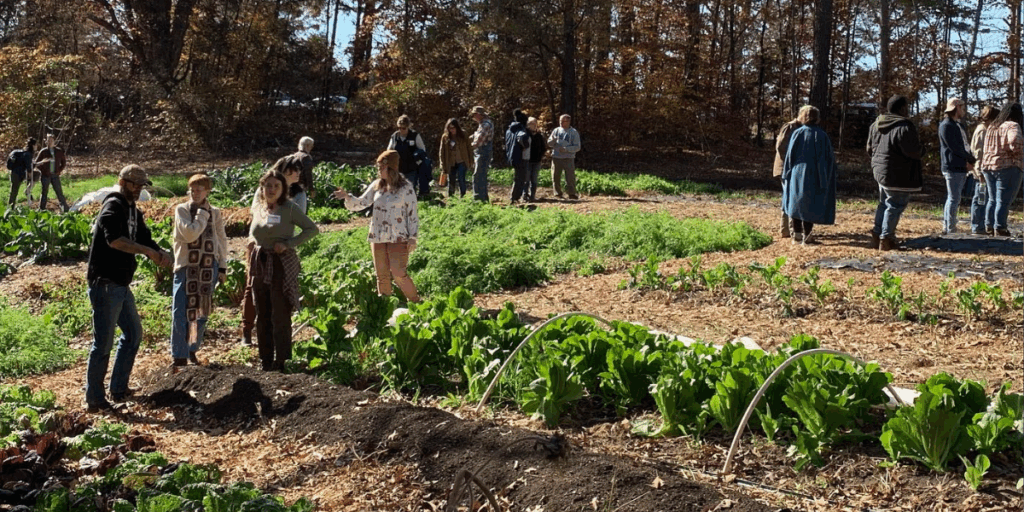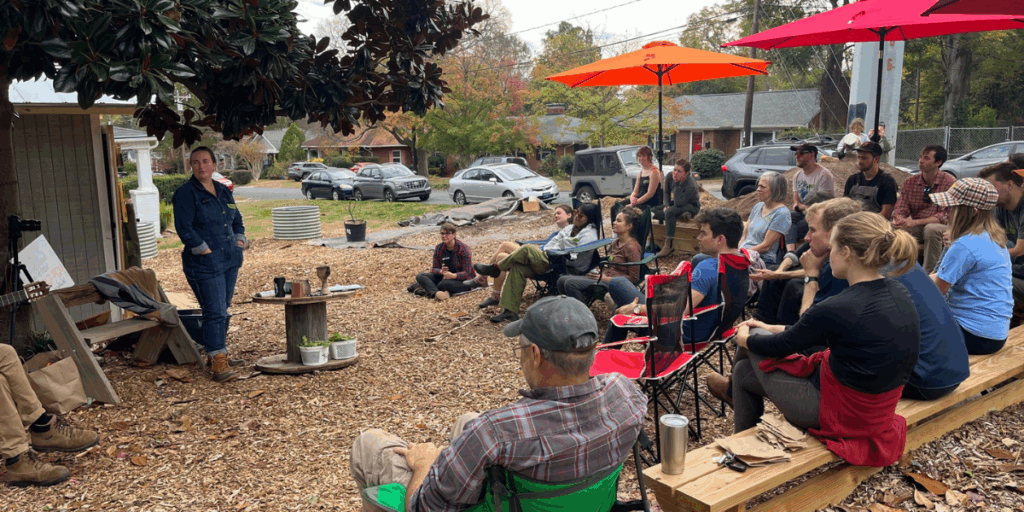“We grow food. We grow faith. We grow community.” That’s the heartbeat of Farm Church, a Fresh Expression of church blooming in the gardens of Durham, North Carolina. Here, churchgoers dig into soil as they dig into Scripture, gathering not in pews but under magnolia trees with garden tools in hand and dirt on their boots.
Farm Church was born out of a bold idea: what if worship and mission could happen right in the garden—feeding both spiritual and physical hunger? This Fresh Expression has not only redefined what it means to “go to church” but has become a transformational force in the community, especially among those who long for faith, purpose, and belonging but feel disconnected from traditional church structures.
In a time when many are asking whether church still matters, Farm Church offers a compelling, earthy “yes”—one harvest, one prayer, one shared meal at a time.

Where the Vision Took Root
Farm Church was co-founded in 2016 by Ben Johnston-Krase and Allen Brimer, two Presbyterian pastors who shared a deep love for Jesus and a holy discontent with the limits of traditional church models. They also shared a conviction that food insecurity is not just a societal issue—but a spiritual one.
“Our call,” Ben reflected, “was to create a worshiping community that engages the body of Christ in the work of cultivating both food and relationships.”
That vision became reality on borrowed plots of land, where early gatherings paired gardening with prayer, worship, and storytelling. While the model was unfamiliar—and sometimes misunderstood—it quickly began to grow. Today, Farm Church gathers every Sunday from 10:00 a.m. to 12:00 p.m., beginning with gardening and ending with worship under a canopy of trees. The experience shifts with the agricultural seasons, blending work and wonder into a natural rhythm of discipleship.
A Church for the Margins, a Table for All
Durham is a city of contrasts—home to research hospitals and rising development, yet shadowed by poverty and food deserts. Farm Church plants itself firmly in the middle of these tensions. In 2024 alone, the community harvested over 3,600 pounds of produce, donating it to local hunger relief partners.
This ministry doesn’t just feed people—it creates space for those on the margins to experience spiritual nourishment, too. Many who come to Farm Church are not “church people.” They are gardeners, seekers, food justice advocates, and neighbors who find joy and purpose in working side-by-side.
“I didn’t grow up in church,” one participant shared, “but I come here and I feel like I’m part of something bigger. We’re growing food—but we’re also growing each other.”
The church is deeply inclusive, affirming people of all races, ages, nationalities, genders, sexual orientations, and economic backgrounds. Whether you arrive with theological questions or tomato seedlings, you are welcome.

Worship Beneath the Magnolia Tree
Sundays at Farm Church start in the dirt. Adults and children pull weeds, water beds, and harvest vegetables. There’s laughter. There’s quiet reflection. There’s holy presence in the shared labor.
At 11:00 a.m., the community gathers in a circle for worship—an organic, participatory service that often includes music, Scripture, storytelling, and weekly communion. Sometimes the communion bread is paired with green beans just picked from the garden—an embodied reminder of wholeness and liberation.
Pastoral intern Katie Mills described it this way:
“I bunched rainbow chard and onions while meeting members of the community – who, I could already tell, had the same sense that I did that there is something deeply spiritual about orienting ourselves down toward the dirt.”
Even the joyful chaos—like cooking lasagna from extra zucchini while dancing to ABBA’s “Dancing Queen”—is part of the worship. At Farm Church, celebration is sacred.
Farm Church shows us what happens when we dare to reimagine church—not as a building or a program, but as a presence. It’s a reminder that we are all invited into God’s work of cultivating justice, joy, and connection right where we are.
Jesus said, “I am the vine; you are the branches… If you remain in me, you will bear much fruit” (John 15:5). Farm Church is bearing that fruit—in kale, in communion, and in transformed lives.
And here’s the best part: You don’t have to be a master gardener or a seminary graduate to start a Fresh Expression. You just have to be willing to plant seeds of hope in the soil of your own community.
Snapshot of a Fresh Expression of Church
What is the Fresh Expression called?
Farm Church
Where is it?
Durham, NC
Who is it for?
Farm Church is for individuals who long for community, connection, and spiritual growth outside the walls of traditional church—especially those passionate about creation care, food justice, and hands-on faith. It welcomes people of all ages, backgrounds, and beliefs who are drawn to embodied worship, inclusive community, and meaningful service.
What do they do?
Farm Church is a Christ-centered community that gathers outdoors to cultivate both food and faith, addressing food insecurity in Durham by leveraging the resources of a farm. Through shared gardening, inclusive worship, and communal meals, they embody a holistic approach to spiritual practice and social justice.
Who is the Pioneer?
Farm Church was co-founded by the Revs. Ben Johnston-Krase and Allen Brimer, who envisioned a worshiping community centered around gardening and addressing food insecurity. Their innovative approach led them to establish Farm Church in Durham, North Carolina, where they integrate faith and farming to serve the community.
Where can I learn more?
This snapshot was developed through thoughtful research using publicly available sources, including websites, news articles, and community updates. While we did not conduct a direct interview, the story shared here reflects the heart and impact of this Fresh Expression as seen through its digital presence.

